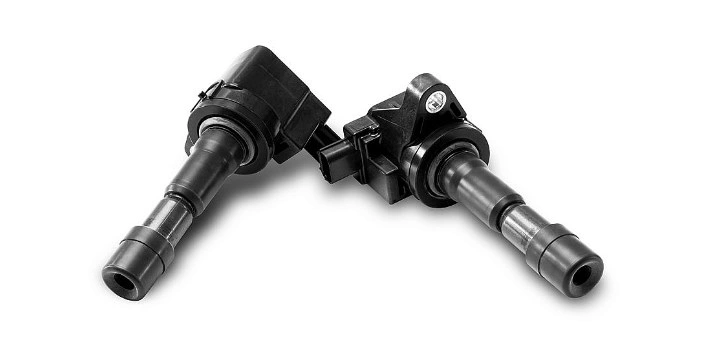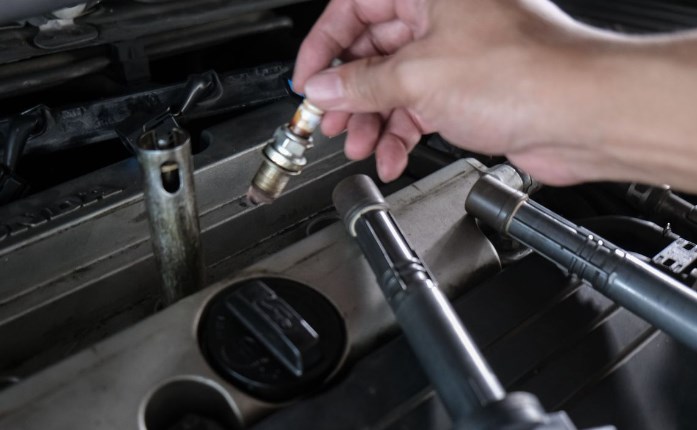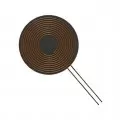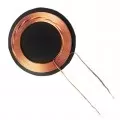OUTLINE:
Ignition Coils: The Spark of Your Engine's Performance
 247
247Integral with the ignition system of a given spark-ignited internal combustion engine is an Ignition coil, commonly referred to as the spark coil. Basically, it is designed to step down the voltage supplied from the battery of the car and increases the value required to produce sparks in the spark plugs. Here, the ignition coil works as a transformer it generates the high voltage that is essential for the effective combustion in the engine through electromagnetic induction. The spark plugs get this high voltage from the spark plug wires hence creating a spark that ignites the engine’s cylinders air fuel mix.

Components of an Ignition Coil
There are two basic components to the ignition coil: In this regard, the secondary and the primary winding. Difference between secondary winding which has very thin wire with a large number of turns as compared to the main winding which has very heavy wire with few turns. Usually by the ignition switch or the engine control unit (ECU), the main winding—which carries a low-voltage current—is linked to the electrical system of the vehicle. The main winding generates a magnetic field stored in the core of the ignition coil when energised.
The construction of the ignition coil depends much on the basic material. Usually composed of a ferromagnetic substance, like iron or steel, it serves to magnify the magnetic field produced by the main winding. Often fashioned as a hollow cylinder or a stack of laminations, the core reduces energy losses via magnetic saturation and eddy currents. The decreasing magnetic field causes a high voltage in the secondary winding, which is subsequently supplied to the spark plugs when the main winding is de-powered.
Along with other parts, the high-voltage terminals link the secondary winding to the spark plug wires and the coil casing, which shields the internal components from environmental elements. To regulate the timing and duration of the spark, certain ignition coils might additionally use electrical components such integrated circuits or transistors.
Troubleshooting a Bad Ignition Coil
An ignition coil failing or starting to degrade may produce a variety of symptoms that could compromise the drivability and engine performance. Typical indicators of a malfunctioning ignition coil consist in:
1. Engine Misfiring or Rough Idling
One or more cylinders in the engine may misfire when an ignition coil is defective. Particularly in an idle vehicle, this misfire causes the engine to operate either harshly or unevenly. When stationary, you might find the vehicle rattles or vibrates; the engine can sound as if it is trying to keep a constant beat. When the engine is under little load—that example, at a stoplight or when traveling at modest speeds—this may especially be apparent.
2. Lower Engine Performance
Particularly, a bad ignition coil may significantly affect the engine ’s general functionality. Ignition coil may develop problems in that it provides a spark that is supposed to ignite the fuel air mix in the cylinders so that incomplete combustion may happen. This could look like regaining slower speeds, less power from the engine and in general, less responsiveness of the car. This may be the case if you find your automobile sluggish especially when climbing hills, or not accelerating as smoothly or as quickly as before.
3. Bad Fuel Consumption
Reduced fuel economy is yet another result of a failed ignition coil. Should the coil provide insufficient spark, the gasoline in the cylinder might not burn entirely, therefore wasting some of it. Inappropriate combustion and misfiring might drive the engine to work more in order to sustain power, hence raising fuel consumption. Though your driving behavior hasn't changed, you could find that you're refilling more often or that the miles per gallon (MPG) of your car has substantially reduced.
4.lit Check Engine Light
Most contemporary cars include an on-board diagnostics (OBD) system that keeps an eye on several engine components, including the ignition system, continually. The check engine light on the dashboard turns on when the system finds a problem with the ignition coil, including misfires or inconsistent voltage levels. Usually one of the earliest indicators of a problem, an OBD scanner allows you to get the error code, therefore supporting your confirmation of whether the ignition coil is responsible.
5. Challenges Launching the Engine
In more severe circumstances, especially if the engine is cold, a malfunctioning ignition coil might make starting the engine difficult. Should the coil not provide sufficient spark to ignite the fuel-air combination, the engine can fail to start completely or run for more than normal. Cold weather typically brings this problem as lower temperatures make it more difficult for the engine to create enough compression and combustion. A poor ignition coil might be the cause of your recurring trouble starting your automobile, particularly if it has been resting for some time.

Diagnosing a Bad Ignition Coil
1. Visual Assessment
Look first at the ignition coil for any evident damage. Look for leaks, burns, or fractures in the coil casing to suggest either physical coil damage or overheating. Additionally look around for any broken spark plug wires or loose connections since they might affect the coil's performance. Should you find evidence of wear or physical damage, the coil may have to be replaced.
2. Resistance Examination
Testing the internal electrical resistance of the coil will come next using an ohmmeter or multimeter. Primary and secondary windings abound in ignition coils; each winding should have a designated resistance range per manufacturer's recommendations. You may measure the resistance of the main and secondary windings by tying the ohmmeter to the terminals of the coil. Should the readings you get noticeably higher or lower than the advised values, it suggests that the ignition coil could be malfunctioning or defective and calls for replacement.
3. Test for Spark
A spark test finds if the ignition coil is efficiently producing a spark to burn the fuel-air combination. Remove the spark plug wire from the coil and hold the end of the wire about 1/4 inch away from a metal ground, like the engine block, to conduct this test. Watch the spark created when someone turns on the engine. You should notice a quite brilliant blue spark. Should the spark be weak, erratic, or missing entirely, it indicates that the ignition coil might not be operating as it should and more examination or replacement could be needed.
4. Oscilloscope Test
Analyzing the waveform of the ignition coil can help you to get a more sophisticated diagnostic. More specialized faults include low voltage, improper ignition timing, or intermittent electrical problems—that may not be evident on other tests—can be found with this one. An oscilloscope reveals anomalies suggesting a malfunctioning coil by capturing the voltage waveform of a coil over time. Because this kind of test calls for more sophisticated instruments and knowledge, professional technicians or specialist auto parts shops with the necessary equipment frequently handle it.
5. Test of Replacement
Should the earlier tests fail to clearly identify the problem, a last resort is to run a replacement test. This entails substituting a fresh or known good coil for the suspected problematic ignition coil momentarily. Start the engine after the replacement and note if the problem has been fixed or whether it runs more smoothly. Should the engine run as expected after a coil replacement, the original ignition coil most certainly caused the issue. Should the problem continue, the source can be another in the ignition or electrical system.
These guidelines help you methodically identify a possible ignition coil failure and decide if replacement is required.
Best Ignition Coil Brands
When changing an ignition coil, you really should choose a premium component from a reliable manufacturer. The following are some of the most outstanding brands of ignition coils available:
Bosch
Renowned brand Bosch provides a large selection of ignition coils for different kinds of vehicles. Their performance, lifetime, and quality are well-known. Many manufacturers' original equipment consists of Bosch ignition coils.
NGK
Japanese firm NGK focuses on spark plugs and ignition coils. High quality, dependability, and exact production techniques abound in their goods. Both OEM and aftermarket uses find NGK ignition coils to be very common selections.
Denso
Another Japanese brand creating premium ignition coils is Denso. Their superior technology, creative designs, and dependability of performance define them. Original equipment for Japanese and certain European manufacturers is frequently Denso ignition coils.
Delphi
Globally producing automobile components, Delphi provides a selection of ignition coils. Their creative designs, dependability, and large product range are well-known. Both OEM and aftermarket uses for Delphi ignition coils are somewhat common.
Standard Motor Products
Leading producer of ignition coils and other automobile components Standard Motor Products is Their wide range of products, reasonable prices, and dependability of performance are well-known traits. The aftermarket has a lot of Standard Motor Products ignition coils.
ACDeldo
General Motors cars' original equipment manufacturer, ACDelco, is also Their ignition coils are made to either equal or surpass OEM requirements, thereby guaranteeing a flawless fit and dependability for GM cars.
Motorcraft
OEM for Ford automobiles is Motorcraft. For Ford and Lincoln automobiles, their ignition coils are designed to provide dependability and extended lifespan. Ford owners seeking OEM-quality replacements usually find motorcraft ignition coils to be the best option.
Spectra Superior
Offering a selection of ignition coils for different car makes and models, Spectra Premium is a Canadian company Their reasonably priced items, high caliber quality, and large range of offerings are well-known. Budget-conscious buyers find Spectra Premium ignition coils to be very popular options.
Choosing an ignition coil requires knowing the right component number for your particular car make, model, and year. Choosing a wrong ignition coil will lead to issues concerning fit, compatibility and even general違いgement of the electrical system in your car. It is therefore recommended that for the right ignition coil of your car, you have to check your Owner Handbook or consult a qualified Auto Spare Parts dealer or Mechanic.
FAQs
Do I have to replace every single ignition coil, or just one?
Usually, particularly if one or more of the ignition coils are defective, it is advised to replace all of them at once. This guarantees constant performance and helps to avoid next problems. You may replace the one problematic coil, however, if only one is bad and the others are in fine shape.
My ignition coils need be replaced how often?
Most manufactures advise either as stated in the vehicle's maintenance plan or every 60,000 to 100,000 miles replacement of igniting coils. Their lifetime may be influenced, however, by things like engine performance, driving circumstances, and ignition coil quality. Following the manufacturer's recommended replacement period is always ideal.
Rather than an OEM replacement, might I use a generic ignition coil?
Although generic ignition coils could be less costly, it is advised usually to use OEM or OEM-equivalent replacement coils. These coils guarantee correct compatibility and dependability as they are made to fit and run best in your particular vehicle type. Generic coils may not always provide OEM equivalents' degree of fit, performance, and longevity.
Which ignition coil would I need for my car?
Choose the right component number for your car make, model, and year when ordering an ignition coil. Your owner's manual or a professional parts shop or technician should have this information. Given the characteristics of your car, they will be able to provide you the proper ignition coil component number.
Can additional problems in my car result from a faulty ignition coil?
Indeed, various issues like engine damage, higher emissions, and worse fuel economy might result from a malfunctioning ignition coil. A malfunctioning ignition coil might lead to misfiring, which would discharge unburned gasoline via the exhaust system. This may harm other parts of the exhaust system including the catalytic converter. Moreover, misfiring may result in incomplete combustion, therefore lowering engine performance and fuel economy.
Conclusion
Selecting a premium ignition coil from a trustworthy manufacturer guarantees consistent performance and extended lifetime for the ignition system of your car. To make a wise choice when choosing an ignition coil take OEM compatibility, durability, and user reviews into account. Timeliness in replacement of ignition coils and regular maintenance allow to avoid expensive problems and guarantee best engine performance.

Disclaimer: The views and opinions expressed by individual authors or forum participants on this website do not represent the views and opinions of Chipsmall, nor do they represent Chipsmall's official policy.

share this blog to:





